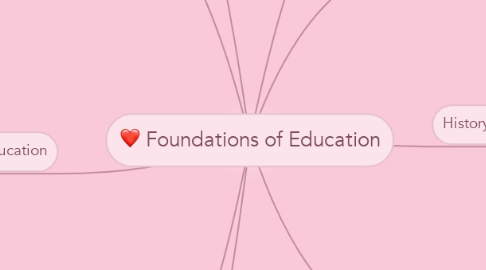Foundations of Education
by Jackee Dodd

1. Philosophy of Education
1.1. Key researchers of Progressivism: John Dewey, Johann Herbert, John Locke
1.2. Says that education should take into account that the student is a social being.
1.3. Says schooling should not be about competition but about learning to cooperate.
1.4. The curriculum of progressivism is known to integrate several subjects but not reflect universal truths, a particular body of knowledge, or a set of prescribed core courses.
1.5. Teachers who use the philology progressivism should teach and plan lessons that deal with group activities. These activities that the teacher plans should be able to help the student use there mind through problem solving, that they work together and use each others minds.
1.6. This is the kind of teacher that serves more as a guide and they facilitate learning by assisting students to sample direct experience. The progressivist teacher works beyond the individual in the classroom.
2. Schools as Organizations
2.1. State Senators: Richard Shelby, Jefferson Sessions
2.2. Alabama House of Representatives is composed of 105 members.
2.3. State superintendent: Tommy Bice
2.4. State Representative on school board: Matthew Brown
2.5. Local Superintendent: Winston County: Greg Pendley
2.6. Local School Board: Winston County Board of Education.
3. Curriculum and Pedagogy
4. Equality of Opportunity
4.1. Students with special needs is a greatly controversial topic but I think that the achievement gap is closing for them. Since 2010 researchers are working to get special needs children in the mainstream with other students. The only thing that should be different about them is based on social and not educational. Labeling a student correctly I'm this field inlays a huge part in allowing the student to achieve everything that they can in education.
4.2. One response to the Coleman study was that a group of minority scholars set about the task of defining the characteristics of schools that made them effective.
5. Educational Inequality
5.1. One explanation of unequal educational attainment is genetic differences. This explanation says that unequal educational performance by working class and non white students is due to genetic differences in intelligence. It says that while environmental causes are important, you can't rule out biological and genetic causes.
5.2. A school centered approach is that people believe that the role of schools is to provide a fair and meritocratic selection for sorting out he best and brightest individuals regardless of family background.
6. Politics of Education
6.1. I chose the liberal perspective because I agree with many of the views. I agree with a market capitalist economy is best but free markets do need to be regulated to stay under control.
6.2. I like the progressive movement because I think there will always be ways to better schools with different advancements.
7. History of U.S. Education
7.1. I think the progressive reform movement had the most influence because it catered to the children based on their needs and the times. All children do not learn the same and child based education is a good thing in my opinion.
7.2. I think the radical revisionist viewpoint in educations history is the best. Sometimes I think that schooling, especially at college levels isn't equal opportunity to some working class level students.
8. Sociological Perspectives
8.1. I think that society has a strong connection to education and that society plays a big role in education. Society places judgments on students and helps shape students minds. I think
8.2. The deviance theory stand out a lot to me in terms of society. I think that society does place judgements on students that sometimes leads to judgements being placed on students by their peers in school.
8.3. 3 affects on schooling to me would be discipline, responsibility and caring teachers. I think all of these things have an effect on students in a big way.
9. Educational Reform
9.1. One school based reform program is the school to work programs. Vocational opportunities have always been offered to students who weren't planning on going to college but now schools and businesses are taking that to another level by helping provide students with work opportunities to help get them started in the working world even before high school graduation.
9.2. Another type of reform is a community reform and an example of this is full service and community schools. The job of this reform is to educate not only the student but also the community, this can help change the community and the students in a positive way.


